starter1 词汇讲解
人教版英语七年级上册Starter Unit1 词汇精讲
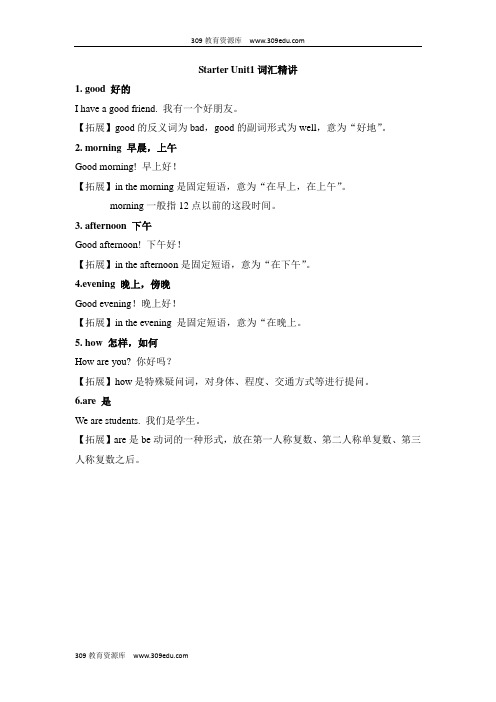
309教育资源库
309教育资源库 Starter Unit1词汇精讲
1. good 好的
I have a good friend. 我有一个好朋友。
【拓展】good的反义词为bad,good的副词形式为well,意为“好地”。
2. morning 早晨,上午
Good morning! 早上好!
【拓展】in the morning是固定短语,意为“在早上,在上午”。
morning一般指12点以前的这段时间。
3. afternoon 下午
Good afternoon! 下午好!
【拓展】in the afternoon是固定短语,意为“在下午”。
4.evening 晚上,傍晚
Good evening!晚上好!
【拓展】in the evening 是固定短语,意为“在晚上。
5. how 怎样,如何
How are you? 你好吗?
【拓展】how是特殊疑问词,对身体、程度、交通方式等进行提问。
6.are 是
We are students. 我们是学生。
【拓展】are是be动词的一种形式,放在第一人称复数、第二人称单复数、第三人称复数之后。
StarterUnit1知识梳理七年级英语上册(人教版2024)
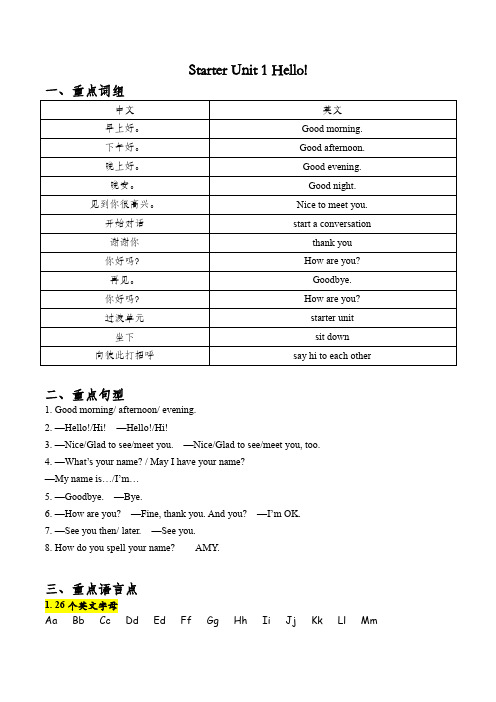
Starter Unit 1 Hello!一、重点词组二、重点句型1. Good morning/ afternoon/ evening.2. —Hello!/Hi! —Hello!/Hi!3. —Nice/Glad to see/meet you. —Nice/Glad to see/meet you, too.4. —What’s your name? /May I have your name?—My name is…/I’m…5. —Goodbye. —Bye.6. —How are you? —Fine, thank you. And you? —I’m OK.7. —See you then/ later. —See you.8. How do you spell your name? AMY.三、重点语言点1. 26个英文字母Aa Bb Cc Dd Ed Ff Gg Hh Ii Jj Kk Ll MmNn Oo Pp Qq Rr Ss Tt Uu Vv Ww Xx Yy Zz元音字母:Aa Ee Ii Oo Uu包含有以下元音的字母:[e]: Aa Hh Jj Kk[i:]: Ee Bb Cc Dd Gg Pp Tt Vv[aɪ]: Ii Yy[ju:]: Uu Qq Ww[e]: Ff Ll Mm Nn Ss Xx Zz2. 打招呼①Good morning:常用于较为正式的问候语。
Good afternoon:一般用于午后至太阳落山时。
Good evening:用于晚上10点以前的时间;当晚上10点以后告别时,则说:Good night(晚安)②Hello!(你好):是朋友、熟人之间见面时非正式的问候语。
可以单独使用,也可加称呼使用。
③Hi! :比“Hello”更简洁,随便。
在年轻人中使用更为普遍。
④Niceto meet you! (很高兴见到你):用于两个初次见面、经介绍相识的人互相打招呼。
Starter Unit1 基础知识点复习

Starter Unit1 基础知识复习一、重点词汇和短语1、good adj. (反义词:bad)(1)好的;令人愉快的A good book 一本好书have a good time 玩得愉快(2)有益的,有效的,适宜的Milk is good for you. 牛奶对你有益。
➢搭配:be good at 擅长be good for 对……有好处/有用be good to 对…… 好/和善例:Sonia, do you think you are different from LindaYes, I’m _____ at drawing than her.A.betterB. goodC. wellD. best[解析]句意:索尼亚,你认为你和琳达不同吗是的,我比她擅长画画。
由than her 可知要用比较极,故A正确。
morning, Helen! 早上好,海伦!“Good morning!”意为“早上好!”或“上午好!”,是正式问候用语,用于早晨向他人问好。
它的回答语仍用“good morning!”。
[拓展链接]:(1)在非正式场合,good可以省略,只用morning互相致以问候。
(2)类似的问候语用法如下表所示:注意:Good night!并不是问候语,而是晚上分别时或就寝前的道别用语,它的含义是“晚安”“再见”。
例:Good morning, Miss Zhang!____________!A. Good morningB. Good afternoonC. Good eveningD. Good night[解析]本题考查交际用语。
A项,早上好。
B项,下午好。
C项,晚上好。
D项,晚安。
句意:早上好,张老师。
早上好。
问候语Good morning 还是用Good morning 来回答。
故A正确。
3、fine adj.(1)晴朗的 a fine day(2)健康的(healthy),身体很好的。
Starter_Unit1-Unit4_知识点总结

Starter Unit1-Unit4 知识点总结1.问候用语Good morning/afternoon/evening!早上好/下午好/晚上好!Good night!晚安!(晚上告别语)—How are you? 你(身体)好吗?—I’m fine/very well/ OK, thanks. How are you? / And you? 我很好,谢谢。
你呢?—I’m fine/OK, too. 我也很好。
注意:若问家人身体怎么样:How +be+家人?2.询问某物用英语怎么说—What’s this/that in English?—It’s a/an…+单数物品. (不用this/that回答,用人称代词it回答。
)be 动词作谓语动词的特殊疑问句:特殊疑问词+be动词(注意人称单复数)+主语+句子其余部分? 具体回答(人称代词):主语+be+句子其余部分.名词单数不要忘记a/anbe动词用法口诀我用am,你用are,is连着他/她/它,单数名词用is,复数名词全用are,1 / 5变否定,更容易,(be)后加not就可以,变问句,往前提,句末问号莫忘记。
指示代词:this/ that/these/thosethis:近指,作主语,谓语动词用单数形式。
that:远指,作主语,谓语动词用单数形式。
these:近指,作主语,谓语动词用复数形式。
those:远指,作主语,谓语动词用复数形式。
冠词a/an/thea和an是不定冠词,只用在可数名词单数前面,表示“一”。
a用在以辅音音素开头的单词前;an 用在以元音音素开头的单词前。
如:a pen /pen/ 一支钢笔(/p/为辅音音素)an orange /'ɔrɪndʒ/ 一个桔子(/ɒ /为元音音素)the是定冠词,表示“这(个),那(个),这些,那些”,在元音音素前读/ði:/,在辅音音素前读/ðə/。
它可以用在名词前,表示特指说话双方都知道的人或物,或上文提到的人或物。
Starter unit 1 知识点复习

Starter unit 1 知识点复习知识点:1.短语归纳:good morning 早上好good afternoon 下午好good evening 晚上好2.必背典句:(1)Good morning, Alice! 早上好,艾丽斯!(2)Good afternoon! 下午好!(3)Hi, Bob! 你好,鲍勃!(4)Hello, Frank! 你好,弗兰克!(5)Good evening 晚上好!(6)—How are you? 你好吗?—I’m fine, thanks. How are you? 我很好,谢谢。
你好吗?—I’m OK. 我很好。
3.英语中常见的问候语①Hello! “你好!”是比较随便、不分时间的一种问候语,通常用于打招呼、打电话。
表示惊讶或引起对方注意。
对方应答仍用Hello!②Hi! “你好!”的使用比hello!更随便。
③Nice to meet you! “很高兴见到你!”是两个初次见面、经介绍相识的人互相打招呼的用于。
回答时能够说Nice to meet you, too.或者Me, too.表示“见到你也很高兴”④How do you do? “你好!”用于初次见面。
对方应答语应是“How do you do?”How are you? 表示问候How are you? 意为“你好吗?”,为询问对方身体状况的问候语,应答语一般是“I’m fine, thanks. / I’m very well, thank you. / I’m OK.How are you? 的其他用法:习惯上回答完别人的问候后,常可反问对方的身体状况,此时可用How are you?也可用And you? /How about you? “你呢?”联想:How ___ he? How ____ your father? How _____ your parents?3.大写字母的用法:①在英语中,句子的第一个单词的第一个字母都应大写。
starter unit1单词

starter unit1单词
1. 欢迎 - 表示对某人的到来或加入的友善举动。
2. 单位 - 指组织、机构或个体的组织部分,可用来指公司、学校、政府等。
3. 开始 - 表示某事物或活动的起始状态或行为。
4. 研究 - 指对某一主题进行系统的调查、分析和探索,以获取新的知识或解决问题。
5. 技巧 - 指在特定领域或任务中所需的专门技能和技巧。
6. 课程 - 指学校或教育机构规定的学习内容和学习计划。
7. 目标 - 指为实现某一愿望或达到某一结果而设定的预期结果。
8. 倾听 - 表示仔细聆听、理解并回应他人的意见、需求或问题。
9. 提问 - 表示向他人提出问题或寻求他人的意见和建议。
10. 学员 - 指参与学习活动的个体或组织。
人教版七年级上册Starter Unit 1知识点归纳
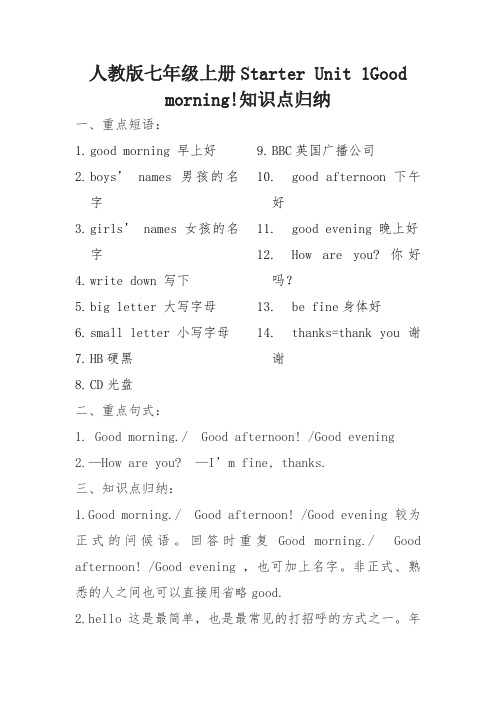
人教版七年级上册Starter Unit 1Goodmorning!知识点归纳一、重点短语:1.good morning 早上好2.boy s’ names 男孩的名字3.girls’ names 女孩的名字4.write down 写下5.big letter 大写字母6.small letter 小写字母7.HB硬黑8.CD光盘9.BBC英国广播公司10.good afternoon 下午好11.good evening 晚上好12.How are you? 你好吗?13.be fine身体好14.thanks=thank you 谢谢二、重点句式:1. Good morning./ Good afternoon! /Good evening2.—How are you? —I’m fine, thanks.三、知识点归纳:1.Good morning./ Good afternoon! /Good evening 较为正式的问候语。
回答时重复Good morning./ Good afternoon! /Good evening ,也可加上名字。
非正式、熟悉的人之间也可以直接用省略good.2.hello这是最简单,也是最常见的打招呼的方式之一。
年轻人第一次见面时,也常用这种方式,表明双方十分亲切、随意和友好。
3. -How are you?-你好吗?-I'm fine, thanks.我很好,谢谢。
也可以说Fine\Not bad\Wonderful\Great\Pretty good\I am OK.4.同义词辨析OK/fine/ good 都表示“好”的意思。
其区别如下:四、语法归纳:人称代词:be动词is/am/areis,am,are的区别是:is在第三人称单数后面使用;am在第一人称后面使用;are用于复数,is、am、are三者都是be动词的一般现在时态,意思为“是”。
Starter Unit 1-unit2 重点知识点

Starter Unit 1 Good morning.1.早上(上午)/下午/晚上好。
晚安(晚间告别用语)2. 你好,弗兰克。
3. A;你(身体)好吗?B;我很好,谢谢。
你呢?A:我也很好4. ______= __________ 谢谢5.光盘英国广播公司Starter Unit 2 What’s this in English1. 这/那是什么?它是一本英语书2. 这/那用英语怎么说?它是我的夹克3.一支钢笔一个桔子4. P停车(区)(美国)全国篮球协会千克5. 请拼读它。
Starter Unit 3 What color is it?1.这/那是什么?这是V。
2. 问颜色:What color1) What color is + 单数名词?2) What color are + 复数名词?It’s /It is + 颜色. They’re/They are + 颜色.3. 这把钥匙是什么颜色的?它是黄色的。
4. 它是黑白相间色。
5. 不明飞行物中国中央电视台联合国6.钥匙是黄色的。
7.他有支钢笔,钢笔是黑色的。
Unit 1 My name’s Gina.1. 你叫什么名字?我的名字叫....../ 我是......2.名字:姓氏:或全名:3. 问电话号码:4. is/am/are的用法:I用am, you用are. 1) I am 14, how old are you?is连着他/她/它2) He/She is a student. What color is it?单数用is,复数用are. 3) The key is yellow. He and I are students.5. 身份证6. 三加五等于八。
7. 九加七等于几?Unit 2 Is this your pencil?1. 人称代词和物主代词1) 人称代词作主语时用主格,作宾语时用宾格。
3) 形容词性物主代词修饰名词(即必须放在名词前面),相当于形容词,在句中作定语。
人教版七年级上册 Starter unit1-starter unit 3 词汇讲义
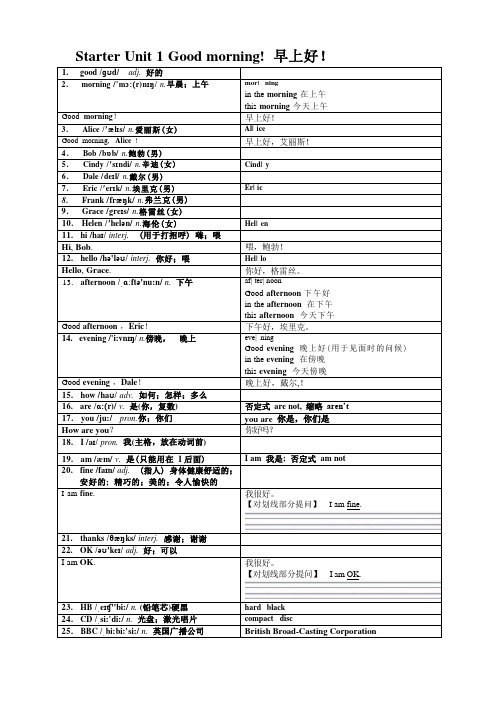
它是什么颜色?
2.red/red/n./adj.红色(的)
inred穿红色衣服的;
aredjacket一件红色夹克衫
【对划线部分提问】Thisrulerisred.
Thisisred.
这是红色.
Thisjacketisred.
这件夹克衫是红色的.
Thisredjacketisgood.
16.quilt/kwɪlt/n.被子;床罩
aquilt
17.it/ɪt/pron.它(动物或事物),用于代替this,that
【填空】
Thisisajacket. ______isgood.
What’sthis? ____isaquilt.
It’sajacket
它是一件夹克衫。
18.that/ðæt/adj.pron.那;那个
5.blue/blu:/n./adj.蓝色(的)
【翻译】穿蓝色衣服的___________
一本蓝色的书___________________
6.black/blæk/n./adj.黑色(的)
【翻译】穿黑色衣服的___________
一把黑色的尺___________________
7.white/waɪt/n./adj.白色(的)
【翻译】穿棕色衣服的_______________一辆棕色的汽车____________________
10.the/ði;ðə/定冠词
【填空】a,an,the
Thereis___parkneartheschool. ____parkis beautiful.
Mymotheriscookingin_____kitchen._____sunissቤተ መጻሕፍቲ ባይዱining.
starter unit1 Hello!知识点总结(思维导图)

注意every / each1.every: 强调整体,指代三个或者三个以上22each: 强调个体、个人,两个或者两个以上e.g He holds an apple in each hand.2. each 可以和of搭配; every 不可以e.g. Each of us agrees with you.3. each / every + 单数名词作主语时,谓语动词用单数e.g. Every student likes the apple.starter unit1Hello!词汇句型 1.基础2.扩展 1. unit n. 单元2. section n.部分 ;地区3. everyone pron.每人;所有人4. spell v.用字母拼;拼写5. bell n.铃(声);钟(声)1.great v. 问候;招呼【变形】greeting n.问候;招呼【搭配】greet sb (with sth) (以某种方式)和某人打招呼【例句】Every morning the students greet theteachers with smiles at the school gate.2.start v. 着手;开始【搭配】start to do sth/ start doing sth.....【例句】Let's start to clean the classroom.3.conversation n. 谈话;交谈【注意】:可数名词:表示某次谈话;不可数名词:泛指谈话【搭配】have conversations/a conversation with sb【例句】I want to have a short conversation with my teacher.4.each adj. / pron. 另外的人(或物)【搭配】each other = one another【例句】We should help each othter.=We should help oneanother.1.- What's your name?= May I have your name? = May I know your name?2.- My name is ......./ I am ......../ 姓名./ Call me +姓名./ You can call me +姓名.2. - How are you?3.- Fine, thank you. / Very well. / I'm great, thanks. / I'm OK.3. Let's go to class.【注意】let's = let us let sb. do sth. 让某人做某事......【考点】考察let后面,人称代词用宾格;动词用动词原形4. It's time for + 名词. = It's time to do sth.【考点】考察for 后面填选名词; 考察 to 后面填选动词原形【例句】It's time for home. = It's time to go home.。
人教新目标七年级英语上册Starter unit1单词+重点句型+语法解析

人教版新目标七年级上 Starter unit 1 Good morning1.good adj.好;好的【解析】联想:look v. 看;book n. 书 be good at 擅长be good for 对……有益;be good to 对……友好反义词:bad2.morning n. 上午【解析】 in the morning 在早上表示在具体的某一天的早上,下午,晚上时用介词on:on the morning of April 3rd 4月3日的早晨Good morning 早上好3.afternoon n. 下午【解析】 after (prep.在…之后)+noon (n.中午)=afternoonGood afternoon 下午好in the afternoon 在下午at noon 在中午4.evening n. 晚上;傍晚【解析】Good evening 晚上好in the evening 在晚上Good night 晚安at night 在深夜5、are v. 是【解析】are 用于人称代词 we,you,they,或复数名词之后,第一人称单数I 与am搭配,第三人称单数与is 搭配。
6.you 可以是第二称单数,也可以是第二人称复数。
7. I【解析】第一人称主格代词,无论在句子中的什么位置I 始终用大写形式,在一般现在时中,其后的be 动词只用am.1、Good morning/Good afternoon/Good evening 上午好/中午好/下午好【解析】① Good morning 一般用于凌晨至中午12点之前,good afternoon 用于中午12点到下午6点之间,good evening 用于黄昏到入睡前。
②见面问候语,常用于比较正式的场合。
在非正式场合和日常口语中,熟人或朋友间常用Moring!/Afternoon! /Evening!进行问候。
注:Good night 并不是问候语,而是晚上分别获就寝前的道别用语,意为“晚安”,“再见”noon 中午 night 夜晚 midday 正午 midnight 子夜yesterday 昨天 today 今天 tomorrow 明天day 日 week 周 month 月 season 季 year 年 century世纪2、How are you?你好吗?【解析】是熟人或朋友见面时询问对方的身体状况的寒暄语。
人教版七年级英语上册Starter Unit1-3单词_知识梳理_词汇句式精讲
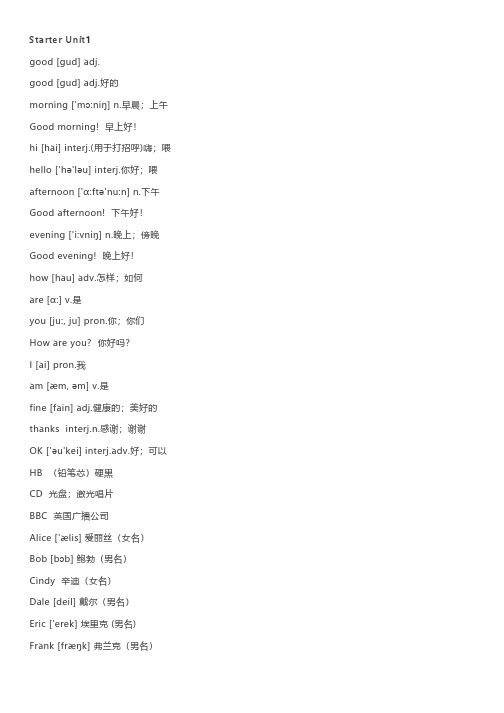
Starter Unit1good [gud] adj.good [gud] adj.好的morning ['mɔ:niŋ] n.早晨;上午Good morning! 早上好!hi [hai] interj.(用于打招呼)嗨;喂hello ['hə'ləu] interj.你好;喂afternoon ['ɑ:ftə'nu:n] n.下午Good afternoon! 下午好!evening ['i:vniŋ] n.晚上;傍晚Good evening! 晚上好!how [hau] adv.怎样;如何are [ɑ:] v.是you [ju:, ju] pron.你;你们How are you? 你好吗?I [ai] pron.我am [æm, əm] v.是fine [fain] adj.健康的;美好的thanks interj.n.感谢;谢谢OK ['əu'kei] interj.adv.好;可以HB (铅笔芯)硬黑CD 光盘;激光唱片BBC 英国广播公司Alice ['ælis] 爱丽丝(女名)Bob [bɔb] 鲍勃(男名)Cindy 辛迪(女名)Dale [deil] 戴尔(男名)Eric ['erek] 埃里克 (男名)Frank [fræŋk] 弗兰克(男名)Grace [greis] 格雷丝(女名)Helen ['helin] 海伦(女名)Starter Unit2what /wɔt/ pron.&adj. 什么is /iz/ v. 是this /ðis/ pron. 这;这个in /in/ prep. (表示使用语言、材料等)用;以English /'iŋgliʃ/ n. 英语adj. 英格兰的;英语的in English 用英语map /mæp/ n. 地图cup /kʌp/ n. 杯子ruler /'ru:lə/ n. 尺;直尺pen /pen/ n. 笔;钢笔orange /'ɔrindʒ/ n. 橙子jacket /'dʒækit/ n. 夹克衫;短上衣key /ki:/ n. 钥匙quilt /kwilt/ n. 被子;床罩it /it/ pron. 它a /ə/ art. (用于单数可数名词前)一(人、事、物) that /ðæt/ pron. 那;那个spell /spel/ v. 用字母拼;拼写please /pli:z/ interj. (用于客气地请求或吩咐)请Starter Unit3color /'kʌlə/ n. (=colour) 颜色red /red/ adj.& n. 红色(的)yellow /\'jeləu/ adj.& n. 黄色(的)green /gri:n/ adj.& n. 绿色(的)blue /blu:/ adj.& n. 蓝色(的)black /blæk/ adj.& n. 黑色(的)white /wait/ adj.& n. 白色(的)purple /\'pə:pl/ adj.& n. 紫色(的)brown /braun/ adj.& n. 棕色(的);褐色(的)the /ði; ðə/ art. 指已提到或易领会到的人或事now /nau/ adv. 现在;目前see /si:/ v. 理解;明白can /kæn/ modal v. 能;会say /sei/ v. 说;讲my /mai/ pron. 我的02Starter Unit 1-3 知识梳理【重点短语】1. good morning/afternoon/evening 早上/下午/晚上好2. good night 晚安3. thank you = thanks 谢谢你4. in English 用英语5. CD 光盘,激光唱片6. BBC 英国广播公司7. NBA (美国)全国篮球协会8. P 停车场,停车位9. kg 千克,公斤10. S 小号的11. M 中号的12. L 大号的13. UFO 不明飞行物【重点句型】1. —Hi, Helen! How are you? 嗨,海伦!你好吗?—Hi, Eric! I'm fine,thanks. 嗨,埃里克!我很好,谢谢。
StarterUnit1单词讲解人教版七年级英语上册

当然,我会为您解释这些单词并提供它们的固定搭配和例句。
以下是每个单词的详细解释:1.goodo解释:好的,优良的,愉快的。
o固定搭配:▪be good at (擅长于)▪good for (对...有益)▪good to (对...友好)o例句:She is good at playing the piano. (她擅长弹钢琴。
)2.morningo解释:早晨,上午。
o固定搭配:▪good morning (早上好)▪in the morning (在早上)o例句:I usually go for a run in the morning. (我通常早上跑步。
)3.hi & helloo解释:打招呼用语,表示问候。
o固定搭配:▪hi/hello there (嗨/你好,那边)▪hi/hello again (再次嗨/你好)o例句:Hi, how are you doing? (嗨,你过得怎么样?)4.afternoono解释:下午。
o固定搭配:▪good afternoon (下午好)▪in the afternoon (在下午)o例句:I like to have a nap in the afternoon. (我喜欢下午小睡一会儿。
)5.eveningo解释:晚上,傍晚。
o固定搭配:▪good evening (晚上好)▪in the evening (在晚上)o例句:We usually watch TV in the evening. (我们晚上通常看电视。
)6.howo解释:怎样,如何。
o固定搭配:▪how about (怎么样,对于...)▪how much/many (多少)▪how old (多大年纪)o例句:How about going for a movie tonight? (今晚去看电影怎么样?)7.areo解释:是(be动词的第二人称单数和第一人称、第三人称复数形式)。
人教版初中英语新教材七年级上starterUnit1知识点归纳总结(复习必背)
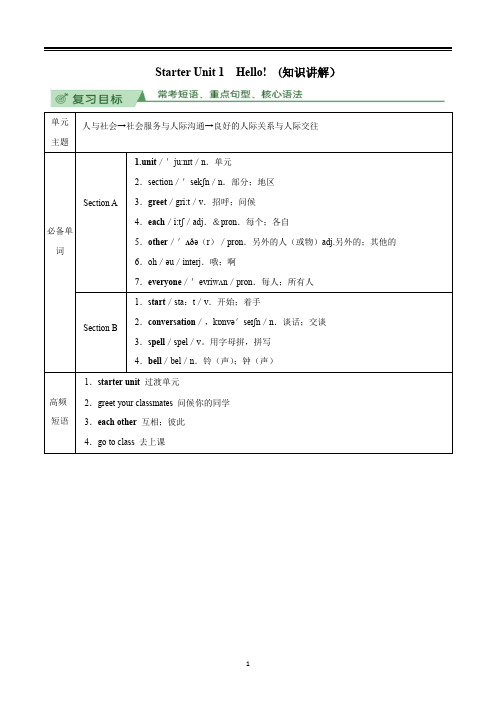
Starter Unit 1 Hello! (知识讲解)单元主题人与社会→社会服务与人际沟通→良好的人际关系与人际交往必备单词Section A1.unit/'ju:nɪt/n.单元2.section/'sekʃn/n.部分;地区3.greet/gri:t/v.招呼;问候4.each/i:tʃ/adj.&pron.每个;各自5.other/'ʌðə(r)/pron.另外的人(或物)adj.另外的;其他的6.oh/əu/interj.哦;啊7.everyone/'evriwʌn/pron.每人;所有人Section B1.start/sta:t/v.开始;着手2.conversation/,kɒnvə'seɪʃn/n.谈话;交谈3.spell/spel/v。
用字母拼,拼写4.bell/bel/n.铃(声);钟(声)高频短语1.starter unit过渡单元2.greet your classmates 问候你的同学3.each other互相;彼此4.go to class 去上课常考句型1.问候语:(1)-Hi,Peter!嗨,彼得!-Hello,Fu Xing!你好,付兴!(2)Good morning,Ella and Emma!早上好,埃拉和埃玛!(3)-How are you?你好吗?-I'm fine,thank you.我很好,谢谢你。
/I'm great,thanks.我好极了,谢谢。
(4)-Nice to meet you.见到你很高兴。
-Nice to meet you too.见到你我也很高兴。
2.询问姓名:(1)-What's your name?你叫什么名字?-My name is Peter Brown.我叫彼得·布朗。
(2)May I have your name?我可以知道你的名字吗?(3)-How do you spell your name?你的名字怎么拼写?-P-E-T-E-R,Peter.B-R-O-W-N,Brown.P-E-T-E-R,彼得。
英语七年级上册 Starter Unit 1 StarterUnit1重点词语解析

Starter Unit 1重点词语解析见面hello“你好”有礼貌【经典例句】—Hello, Cindy! 你好,辛迪!—Hello, Dale!你好,戴尔!【启发点拨】hello是英语中使用频率较高的日常用语之一。
它可以用于:(1)表示问候、打招呼,意为“你好”,多用于熟人、朋友之间。
例如:Hello, Frank!你好,弗兰克!(2)用于“引起对方注意、打电话”时,意为“喂”,语气较随和。
例如:—Hello! 喂!—Hello, this is Jim. 喂,我是吉姆。
【温馨提示】在现代英语中,可以用hi替换hello,只是hi 显得更随便、随和。
are“是”什么精灵【经典例句】—How are you? 你好吗?—I’m fine. 我很好。
【启发点拨】are是系动词be的一种形式,意为“是”,常与第二人称you,第一人称复数形式we,第三人称复数形式they等连用。
例如:You are a good girl. 你是一个好女孩。
They are Alice and Lucy. 她们是艾丽丝和露西。
【知识延伸】系动词be的另外两种形式是am和is,都意为“是”。
其中am只能与第一人称单数I (我)搭配。
is主要和第三人称单数he(他),she(她),it(它)连用。
例如:I am Tom. 我是汤姆。
She is fine. 她很好。
“谢谢”thanks常常说【经典例句】①—Sit down, please. 请坐。
—Thanks. 谢谢。
②—Thank you very much. 非常感谢你!—That’s OK. 不用谢。
【启发点拨】thanks既可以用作感叹词,也可以用作名词,意为“谢谢”。
用作名词时,必须用复数形式,后面不能接人,其动词形式为thank。
表示感谢还可以用Thank you (very much)!或Thanks a lot!【知识延伸】句型Thanks for...或Thank you for... 表示“因……而感谢”;短语thanks to表示“由于;多亏”。
人教版七上英语词汇精讲--Starter Unit1-3

Starter Unit1 Good morning !1. goodadj.好的e.g. Have a good day ! 玩的开心!welladv. 好的adj. 身体状况好e.g. He plays football well. 他足球踢的好。
e.g. Tom's parents are well. 汤姆的父母身体很好。
2.morning n.早晨;上午in the morning 在早上on a cold morning 在一个寒冷的早上on Friday morning 在周五早上on the morning of May third 在五月三号早上this morning 在今天早上3.Good morning 早上好!Good afternoon 下午好!Good evening 晚上好!Good night 晚安!4.hi interj. (用于打招呼) 嗨;喂5.hello interj.你好;喂say hi/hello to sb. 和某人打招呼6.afternoon n.下午noon n.中午at noon 在正午7.evening n.晚上;傍晚night n.夜晚at night 在半夜8.how adv.怎样;如何How are you?你好吗?How old are you? 你多大了?9.are v.是(原型为be,用于第二人称单数及所有人称复数)10. you pron.你;你们e.g. You are a good boy! 你是个好孩子!11.I pron.我12.am v.是(原型为be,用于第一人称单数)I am = I'mI am not 不能缩写13.fine adj.健康的;美好的e.g. I'm fine. 我很好。
14.thanks interj.&n.感谢;谢谢=thank youe.g. Thanks a lot! / Thanks very much! 非常感谢15.OK interj.&adv.好;可以okay OK全称Starter unit 2 What's this in English1.what pron.&adj. 什么when什么时候where 哪里who 谁whose 谁的which 哪一个;哪一些how 怎么样what about doing sth.= how about doing sth. 做......怎么样so what 那又怎么样What a pity! 多么遗憾呀!2.in prep.(1) 用、以in +语言表示用…语言e.g. in English 用英语e.g. in Chinese 用汉语e.g. in Japanese 用日语(2) 在…里There are some gifts in the box.(3) in + 颜色穿着某种颜色的衣服The boy in red is my brother.3. English n. 英语adj. 英格兰的,英国人的England n. 英国Englishman n. 英国人复数:Englishmen China n. 中国Chinese n. 汉语;中国人adj. 中国的Japan n. 日本Japanese n. 日语;日本人adj. 日本的France n. 法国French n. 法语;法国人adj. 法国的Germany n. 德国German n. 德语;德国人adj. 德国的America n. 美国American n.美国人adj. 美国的4. map n. 地图a map of China 一张中国地图on the map 在地图上A of B: B的Ae.g. the door of the rooma photo of my family5. orange n. 桔子、桔汁adj. 桔色的【区别】It’s orange.It’s an orange.It’s an orange cup.6. key n.钥匙adj. 关键的a set of keys 一串钥匙(后面谓语动词用单数)the key to the door 门的钥匙key words 关键词keyboard 键盘keyword 密码the key to (doing) sth. 做......的关键key points 关键点7. this【拓展】Is this your brother? 肯定回答__________Is this boy your brother? 肯定回答__________总结:当问句的主语是this或that时,回答用it替代。
Starter1笔记
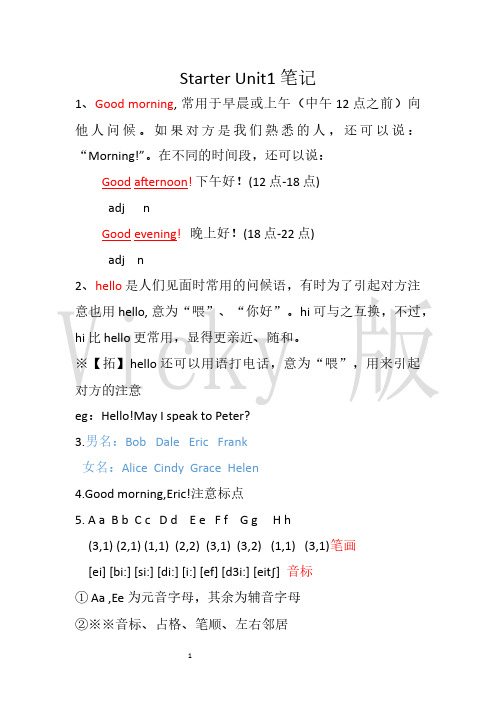
Starter Unit1笔记1、Good morning, 常用于早晨或上午(中午12点之前)向他人问候。
如果对方是我们熟悉的人,还可以说:“Morning!”。
在不同的时间段,还可以说:Good afternoon!下午好!(12点-18点)adj nGood evening!晚上好!(18点-22点)adj n2、hello是人们见面时常用的问候语,有时为了引起对方注意为“喂”、“你好”。
hihelloeg:Hello!May I speak to Peter?3.男名:Bob Dale Eric Frank女名:Alice Cindy Grace Helen4.Good morning,Eric!注意标点5. A a B b C c D d E e F f G g H h(3,1) (2,1) (1,1) (2,2) (3,1) (3,2) (1,1) (3,1)笔画[ei] [bi:] [si:] [di:] [i:] [ef] [d3i:] [eit∫] 音标①Aa ,Ee 为元音字母,其余为辅音字母②※※音标、占格、笔顺、左右邻居③相同因素[i:] B/C/D/E/G[ei] A/H[e] F6.HB=Hard Black 硬黑CD=Compact Disc 光盘BBC=British Broadcasting Corporation英国广播公司【拓】AD公元 BC公元前CAAC中国民航 CBA 中国篮球协会美国广播公司 PRC 中华人民共和国同音IGoodbye!Bye!9.Aa, Bb, Cc, Dd, Ee, Ff, Gg, Hh是英语字母中的前八个字母,其中Aa和Ee是元音字母,其余为辅音字母。
其字母的发音规则如下:字母A a 在闭音节中发 音。
如:fat 胖的。
字母 Aa 在开音节中发音。
如:cake 蛋糕。
字母Ee在闭音节中一般发音;在开音节中发 音。
如:bed 床;me 我。
- 1、下载文档前请自行甄别文档内容的完整性,平台不提供额外的编辑、内容补充、找答案等附加服务。
- 2、"仅部分预览"的文档,不可在线预览部分如存在完整性等问题,可反馈申请退款(可完整预览的文档不适用该条件!)。
- 3、如文档侵犯您的权益,请联系客服反馈,我们会尽快为您处理(人工客服工作时间:9:00-18:30)。
1.morning
[ˈmɔːnɪŋ]
n.早晨;上午;开端
用法:
1. this morning 今天早上
Did you really feel ill this morning?
今天早晨你真的感到身体不适吗?
2.on cold morning在寒冷的早晨
He is loath to get out of bed on cold morning.
在寒冷的早晨他讨厌起床。
3.from morning till night从早到晚
The people next door play their radio from morning till night.
邻居从早到晚开着收音机。
练习:英译汉
1.It was five o'clock in the morning.
2.She may have gone out now, so I will telephone her in the morning.
3.He is busy from morning till night
答案:
1.那是在早上五点钟。
2.她现在可能已经出去了,我明天早晨再给她打电话。
3.他从早忙到晚。
2.nice
英[naɪs]美[naɪs]
adj.好的;美妙的;友好的;令人愉快的;精细的
用法:
1.用作定语~+ n.
We're thinking of moving and we looked over a couple of nice houses at the weekend. 我们想换个地方住,周末我们去看了几栋漂亮的房子。
It was the third nice and long lecture that he delivered this week.
这是他本周作的第三次冗长的演讲了。
2.用作表语S+be+~
I really don't know which to choose, because they are both very nice.
我真不知道该选哪一个,因为两个都很漂亮。
The bathroom would look much nicer if the pipes were boxed in.
如果把这些管子嵌入墙内,浴室就会好看多了。
练习:英译汉
1.It's a nice day today.
2.I brought her a very nice present from Soochow. 答案:
1.今天天气很好。
2.我从苏州给她带来一件美妙的礼物。
3.you
[ju]
pron.你;你们;(泛指)任何人
用法:
1.作主语或者宾语
Can you tell me the nearest way to the station?
你能告诉我去火车站最近的路吗?
I thought she told you.
我以为她告诉你了。
It was absurd of you to do such a thing.
你做那样的事是愚蠢的。
2.固定搭配
you name it凡你能说得出的...
if you please随你便(如果你高兴的...
练习:英译汉
1.Do you speak English?
2.I shall await you at seven-thirty or thereabouts.
3.You must all listen carefully.
4.Do you have a room available?
答案:
1.你会说英语吗?
2.我将在7点30分左右等着你。
3.你们都必须仔细听着。
4.你们有空房间吗?
4.meet
[miːt]
v.遇见;满足
n.运动会;集会
adj.合适的
用法:
1.~+名词
meet an old friend 遇见一位老朋友
meet bill 付账
meet danger 遇到危险
meet need 满足需要
meet obligations 尽义务
meet problem 解决问题
meet qualifications 合格
meet sb's eye 与某人的目光相遇
meet sb's train 到火车站去接某人
meet situation 应付局面
meet specification 合乎规格
meet the emergency 应付紧急情况
2.~+副词
meet again 再次遇见
meet halfway 过早地担忧,半路迎接
meet accidentally 偶然遇见
meet bravely 临危不惧
meet casually 碰巧遇见
meet coincidentally 碰巧相遇
meet convivially 欢乐地聚会
meet fraternally 兄弟般地迎接
meet joyfully 高兴地迎接
meet solemnly 隆重地迎接
meet surreptitiously 秘密会谈
meet temperately 适当地迎接
meet traditionally 传统地相会
meet up 偶然碰到
3.~+介词
meet as strangers 像陌生人一样相见
meet at 在…见面
例句:
1.They could hardly make both ends meet and their debts were piling up. 他们很难收支相抵,因而债台高筑。
2.The Debating Society meets every Friday at 8 pm.
辩论会每周的星期五下午8时开会。
3.Have you met him?
你见到他了没有?
4.If we go this way, we shall probably meet him.
如果我们从这条路去,我们也许会遇到他。
练习:英译汉
1.We write regularly but seldom meet.
2.Their hands met.
3.Congress will meet next month.
4.The whole school met to hear the speech.
5.I met one of my friends in the street yesterday.
答案:
1.我们经常通信,却很少见面。
2.他们的手相触。
3.国会将于下月开会。
4.全校师生集合听演讲。
5.昨天,我在街上遇见一个朋友。
5.her
[hə(r)]pron.她(宾格)
adj.她的
abbr.纹章术;纹章学(=heraldry)
用法:
1.作宾语
He was able to be cold about her now.
他现在对她可能有些冷淡。
Give her the book.
把书给她。
2.做形容词性物主代词
I accepted her view without any reservations.
我毫无保留地同意她的看法。
练习:英译汉
1.That's her book.
2.Give her the book.
答案:1.那是她的书。
2.把这本书给她。
6.first
[fɜːst]
adj.第一的;最初的
adv.首先;第一
n.最初;(序数词)第一
用法:
1.~+名词
first aid 急救
first importance 头等重要
first light 天刚亮时
first name 名字
first person〔place, time〕第一人称〔名,次〕
first principles 基本原理
2.动词+~
stand first in the class 在班上名列第一
例句:
1.I'm the first in our village to go to university.
我是我们村第一个上大学的。
2.When we first lived here there were no buses.
我们最初住在这里的时候,没有公共汽车。
练习:英译汉
1.The first is better than the second.
2.This second event was contemporary with the first.
3.First, let me deal with the most important difficulty.
4.Modern music was first developed in Italy.
答案:
1.第一个比第二个好。
2.第二个事件和第一个事件发生在同一时代。
3.首先,让我来处理最为重要的问题。
4.现代音乐最初是在意大利发展起来的。
